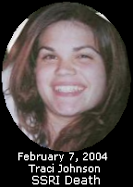 Yes, you did read it correctly. Mourning a relative or loved one who just died? You will not be considered normal. You will be a person who suffers major Depressive Disorder. In other words: you will be prescribed all antidepressants, mood stabilizers, antipsychotics, benzodiazepines... all the cocktails people with major depression try.
Yes, you did read it correctly. Mourning a relative or loved one who just died? You will not be considered normal. You will be a person who suffers major Depressive Disorder. In other words: you will be prescribed all antidepressants, mood stabilizers, antipsychotics, benzodiazepines... all the cocktails people with major depression try.It is at The New York Times in an article by Allen Frances former emeritus professor at Duke University:
"Turning bereavement into major depression would substitute a shallow, Johnny-come-lately medical ritual for the sacred mourning rites that have survived for millenniums. To slap on a diagnosis and prescribe a pill would be to reduce the dignity of the life lost and the broken heart left behind. Psychiatry should instead tread lightly and only when it is on solid footing.There is still time to keep the suggested change from entering the D.S.M. 5, which will not be published until May 2013. The task force preparing the new manual could adopt a more cautious and modest estimation of the reach of psychiatry and its appropriate grasp."
January, 31, 2009 I did a post where they wanted to diagnose caffeine withdrawal and in December, 2009 another post about psychiatrists, including eminent retired Robert Spitzer and Allen Frances, that proposed an end to the DSM:
"Some of the harshest criticisms have come from those who led previous revisions of the DSM, in 1980 and 1994. In July, Robert Spitzer and Allen Frances, both now retired, wrote a stinging letter to the APA, accusing it of planning unworkable changes and making grandiose claims. In a separate editorial in the magazine Psychiatric Times, Frances complained that most of the authors are university-based researchers who are cut off from typical doctors and patients.Spitzer and Frances also criticise the fact that members of the various DSM-V work groups have had to sign confidentiality agreements. "The main problem is that we don't know what they're doing," says Spitzer. The APA says the confidentiality agreements are to stop the manual's authors writing their own diagnostic handbooks alongside the official manual. Kupfer points out that discussion does go on: work groups proposing major changes debate their ideas in papers and at meetings. "We've done everything we can to encourage it," he says."
It seems that they have been silenced and I have no idea why there are so many good psychiatrists that are very aware of the harms their patients are experiencing under these drugs don't unite and say NO to all these absurds. I don't think they will ever listen to their patients and only their peers seems to have the power to make any difference. Psychiatrists of the world, unite and try to make some sense to your field.
I got the information of the article at Facebook in a comment Susan at If you're going through hell keep going did. Love you dear and thank you!
I got the information of the article at Facebook in a comment Susan at If you're going through hell keep going did. Love you dear and thank you!
















4 comments:
Why don't the doctors say no? Because the doctors are paid to prescribe, not treat. The industry is predicated on short 15 minute visits-the more people they see, the more money they collect.
Outcomes? Healing? Recovery? Amelioriation of pain?
That's wooly headed neo socialist crazy talk.
Just see them and move on and see someone else.
This isn't a health care system, it's a wealth care system-as long as you have some, you get some care.
"As long as you have some..." exactly. Some people don't have that much and end up having to pay a lot for these drugs because they are addictive.
Even missing a dose of some SSRIs causes problems.
Some people stop eating well to have money to buy the drugs.
Lexapro almost killed me 4 years ago. I have had 2 strokes since then and I am only 38. I had a severe adverse reaction and I have brain damage caused by it. I have written about some of it as a blog entry but there is so much more to it.
I would like to be part of raising awareness about the dangers associated with SSRI's.
Please e-mail me at psychesick@hush.com
Hi Psychesick,
I answered you at your blog.
Welcome to the club! You will find many people telling their story and will feel comfort knowing that you're not alone.
Just by blogging you are raising awareness.
Thank you for sharing your story.
Ana
Post a Comment